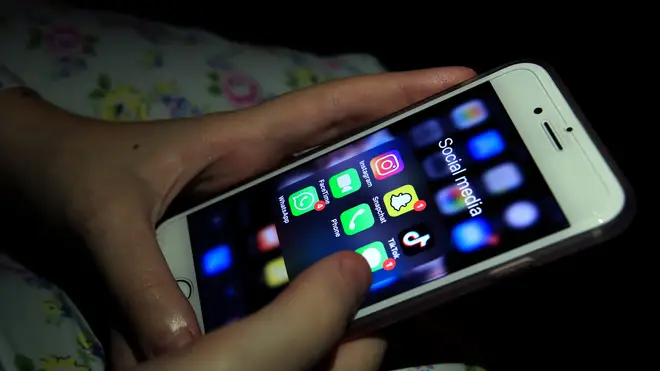
James O'Brien 10am - 1pm
16 December 2021, 00:04

Young people want challenging topics to be tackled before children are given phones or social media accounts, guide suggests.
Parents should talk to their children about online sexual harassment and pornography earlier on, the Children’s Commissioner for England has said.
Dame Rachel de Souza said young people want parents to broach these challenging topics with children before they are given smartphones or social media accounts – which is often around the age of nine or 10.
The Office of the Children’s Commissioner for England has produced a guide for parents – with the help of teenagers and young adults – on how to discuss sexualised bullying and peer-on-peer abuse online.
The “overriding” message from the group of 16 to 21-year‑olds was “talk early, talk often”, Dame Rachel said.
It comes after thousands of testimonials were posted on the Everyone’s Invited website earlier this year, with some pupils accusing their schools of not tackling a “rape culture”.
Ofsted’s review into safeguarding in schools concluded in June that sexual harassment has become “normalised” for schoolchildren – and inspectors were told that boys are sharing “nudes” among themselves like a “collection game” on platforms such as WhatsApp and Snapchat.
The guide advises parents to start conversations “early” – before their child has a phone or a social media account – and to keep the conversation going to ensure “awkwardness” or “taboo” subjects do not build.
It adds: “Find everyday opportunities to speak about relationships and the online world – like when you’re walking or driving somewhere. Young people told us that they didn’t want ‘the big talk’.”
Some of the top tips to parents from 16 to 21-year-old include not allowing porn to become a “taboo subject” and instead keeping conversations “casual”.
One young person said: ““I feel like the best time for parents to have a conversation about porn is a bit earlier for boys than girls. From my experience of male friends, they definitely see porn earlier than my female friends. I mean like early: year 4, year 5, year 6.”
Parents should not “jump to conclusions” if they find out their child has sent or received nudes and they should “calmly” speak to their child to try to understand why the image or video was shared, according to the guide.
It suggests that parents should start speaking to their child about the “risks of sharing pictures” when they first give them a phone and they should explain to their child “early on” that they might be sent naked pictures.
Dame Rachel said: “You might be surprised how early our young people felt parents need to start the conversation. But kids want an age‑appropriate conversation that evolves over time in line with their growing maturity.
“My advice to parents and carers is to create the culture before the crisis. Children have told us they want their mums and dads to create a safe, judgment-free space for them to talk about these issues.
“It’s better to do that before you hit a problem rather than trying to create that mood while you’re dealing with one or discovering later that they hadn’t felt able to tell you.
“It takes a lot of bravery for a child to share their experiences of abuse or harassment. Parents and carers are telling me they want to match that bravery in getting to grips with these issues.”
A Department for Education (DfE) spokesperson said: “All children should be able to enjoy the online world safely – both at home and in school – and this new guidance from the Children’s Commissioner will support parents in helping them to initiate open and honest conversations with their children about staying safe online.
“To further support children, we have made online safety a key component of the new mandatory Relationship, Sex, and Health Education curriculum.
“Ministers and the Children’s Commissioner also recently met with technology companies to ask them to do more to keep children safe online ahead of the Online Safety Bill coming into force.”